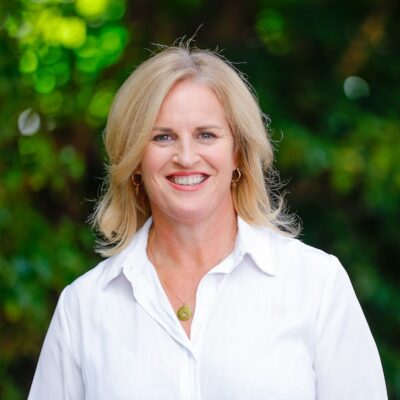Giving back is good for business
Vicki Scott, CEO and founder of Crimson Organics, shares the benefits of giving back in business and offers a few tips for others wanting to do the same.
Lawyer, mother of three, CEO and founder of Crimson Organics, Vicki Scott shares the benefits of giving back in business and a few tips for others wanting to do the same.
NZB: Why is giving back important to you and how did you decide it would be a fundamental part of your business?
V: In my 25 years as a criminal defence lawyer and advocate for equity for women, I’ve become increasingly aware of an unspoken inequality, especially in my work with our local homeless community. The issue is what we call “period poverty” and it is rampant in New Zealand.
This really put a fire in my belly, because access to period care is a fundamental human right. I wondered what I could do about it. On top of this, at a personal level, I was irritated by the fact that my female colleagues and I had to even consider our period needs in the rapid courtroom environment and it got me thinking about how women could level the playing field for managing their periods at work and in life generally. That’s how I hit upon the idea of automated delivery of tampons to busy women who could afford to buy them and who in turn contribute to the donation of tampons to women who cannot. Women helping women.
NZB: What advice do you have for a Business that wants to include a Give Back Component?
V: Firstly, be really clear on your “why” ie why are you wanting to benefit that particular cause or organisation? What are you hoping to achieve and what would your ideal impact look like? There are so many competing and worthwhile charitable causes that beckon consumers for their support. You really need to explain the impact of the problem you are trying to solve in a way that resonates with your customer base or on-line community.
For us at Crimson it was a case of selling organic tampons that “help your health while also helping someone else”. We had done the research and knew it was a pain point and stressor for women to have lack of access to period care products. It presented so many barriers to life and limited freedom of movement and attendance at school, work etc. It is the reason that hundreds of girls stay home from school each month, disrupting their education. If we could positively impact in that area we knew it would have significant impacts.
Secondly, give your customers an opportunity to be part of the “give back” process. Your business can lead the way with donations, but also inviting customers to donate is empowering for them and enhances that sense of community among your customer base. For example, Crimson both donates products and invites customers to purchase products to donate to organisations that work with homeless and vulnerable women. We often get emails and letters from women who have received donated product. We share their thanks and stories with our Crimson community. This in turn creates a high level of engagement from our on-line community and a palpable sense of them feeling like they are part of something bigger by paying it forward for the sisterhood.
NZB: What are the wider issues and is it a challenge to highlight that to your customers?
V: People are increasingly making more ethical based choices when it comes to shopping, particularly once they have all the information about the environmental cost of their choices. By making customers aware of that cost, the journey to convert them to choose your product is shorter and easier.
For example, many people are unaware that conventional cotton is one of the most sprayed crops in the world, and that the pesticides used get washed into our waterways and ecosystems. Not to mention the harm pesticides can cause to cotton workers. When we educate our consumers about these facts via our social media campaigns and e-newsletters, the decision for them to choose Crimson organic cotton products over conventional brands becomes easier for them. In our product category women are very brand loyal ie what they have been using for years they keep buying each month automatically. So giving women a good reason to try a new brand was key to converting them to Crimson. Certification is another way to build credibility and trust. Our products carry two international certifications that our products are 100% organic and ethically produced. This independent verification enhances consumer confidence in trying a new brand.
NZB: As a busy mum and mother of three what made you want to add more to your plate by starting a business?
V: As a lawyer, I had spent years advocating for the rights of women and vulnerable people. It seemed a natural transition to establish a business that shone a light on period poverty and women’s rights to access period products. And once I became aware of what was in conventionally branded period products (plastic, chemicals, pesticides, and synthetics) I was very motivated to educate other women on the dangers these nasties can pose and offer them a safe alternative. Most of the women I spoke to had no idea what was actually in their monthly products and implications for their health, because manufacturers aren’t required to disclose that on their packaging. Giving women the opportunity to make informed decisions for their menstrual health is a fundamental human right and it seemed to me that women weren’t being given a fair opportunity to exercise that right. A lot of Crimson’s social media campaigns have focused on the benefits of choosing 100% organic cotton period care such as less irritation and cramping, better for our bodies and the planet, fast biodegradability due to no plastic or synthetics, safer for cotton workers, and reduced risk of Toxic Shock Syndrome.
I also knew that the convenience of having products delivered to women’s homes automatically each month would appeal to women, as our lives are becoming increasingly busier and it would mean one less thing to think about each month.
NZB: What feedback or responses have you had from customers and others in your industry?
V: Other business owners are very supportive and it’s definitely a great conversation starter as people are increasingly concerned about the ethical and environmental impacts of their purchases.
In terms of customers, overwhelmingly they comment on a decrease in cramping so it is very eye opening for people when they realise the difference that a product without synthetics and chemicals can make. Women also love having their tampons delivered so they never run out but my favourite emails come from women who have received donations of tampons and feel overwhelmed by that act of kindness, such as this email:
“Vicki you made my week. My family and I are trying desperately to pay the bills due to my husband being made redundant. We can’t afford the luxury of me using tampons and I have been making do with my husband’s socks. Thank you for your kind words and generosity. Pain shared is halved and joy shared is doubled.”
Giving back is definitely good for business.
Vicki has spent 25 years as a criminal defence lawyer and advocate for equity for women, primarily as a criminal defence lawyer seeking outcomes for women that recognise their circumstances and vulnerabilities. Vicki set up Crimson organics as a way to help women and enable them to help each other too.
https://crimsonorganic.co.nz Instagram: @crimsonorganic






